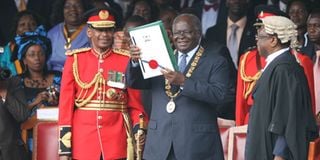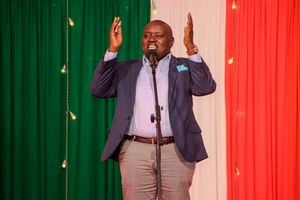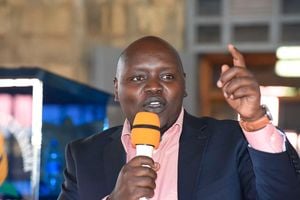
The late President Mwai Kibaki during the promulgation of the Constitution on August 27, 2010.
Promulgated in August 2010, Kenya’s Constitution has stood resilient against attempts to alter some of its core provisions.
Every effort to change it has met stringent barriers, a testament to the drafters’ intent to preserve the people’s sovereignty.
In the sixth such attempt, a proposal by Nandi Senator Samson Cherargei to extend the presidential term limit and the tenure of other elected leaders has stirred strong debate, with Kenyans demanding to be told if the move aligns with the spirit of the supreme law.
According to former Law Society of Kenya (LSK) president Eric Theuri, the Constitution of Kenya (Amendment) Bill, 2024, should be “summarily dismissed” and not be allowed to get to the floor of the House.
“Subjecting this to debate in Parliament will be contrary to the Constitution itself,” Mr Theuri said.
For the Bill to be properly placed in Parliament, Mr Theuri argues, it should emanate from the people and not elected leaders who have failed in their oversight role of the Executive.
Constitutional gaps
Thirdway Alliance party leader, Ekuru Aukot, says the ongoing conversation is a waste of time, adding that Kenyans are struggling with economic, health, infrastructure and many other challenges.
“This is a misplaced priority. It not the spirit of the Constitution that we wrote; it is not what Kenyans adopted,” he told the Weekly Review.
Dr Aukot criticises the Kenya Kwanza alliance government as ineffective, and blames Prof Kithure Kindiki’s leadership as the Cabinet Secretary in charge of Interior for presiding over “killings of innocent Kenyans”.
“What has President William Rutos’ administration done for Kenyans to reward him? The term limit was deliberately included in the Constitution to safeguard Kenyans from leaders with autocratic tendencies,” he said.
While many agree that the Constitution has gaps that need to be addressed, Senator Cherargei’s proposal has brought to attention to the safeguards meant to ensure any constitutional change genuinely reflects the will of citizens.
The first major push to amend the Constitution was initiated by the Council of Governors and spearheaded by then-council chairman and Bomet County boss Isaac Ruto in 2014.
Though it failed, it left a lasting impact on the country’s political landscape by advocating for increased financial empowerment of devolved governments.
It sought to increase funding for counties to strengthen devolution, ensuring county governments had sufficient resources to address local needs and provide services.
While they pushed for an increase in the allocation of national revenue from the constitutional minimum of 15 to 45 per cent, the campaign faced strong opposition from the national government, which argued that it would strain the country’s budget and affect critical sectors managed by the central government.
The campaign ultimately failed to meet the requirements for a referendum, dealing a blow to the Council of Governors.
In 2015, less than a year after the attempt by governors, Mr Raila Odinga – who was the leader of the opposition Coalition for Reforms and Democracy (Cord) – initiated another constitutional amendment effort.
Through Article 257 of the Constitution which allows for changes that originate outside the Legislature, Cord embarked on collecting more than 1.6 million signatures from registered voters for the Bill to be considered by most county assemblies before being introduced to Parliament.
The Okoa Kenya Bill also sought to increase devolution funding and called for electoral, land and public service reforms.
However, the initiative by the opposition failed as the Independent Electoral and Boundaries Commission (IEBC) rejected the signatures collected.
Then-IEBC chairman Issack Hassan announced that the opposition alliance failed to get the one million signatures necessary to force a referendum, declaring that only 891,598 signatures of the 1.6 million submitted to the commission had been found to be authentic.
The 2017 “Punguza Mizigo” Initiative by Dr Aukot presented another opportunity for Kenyans to make changes to the Constitution.
However, it failed to receive approval by at least 24 county assemblies as stipulated in the Constitution.
Touted as a drive to reduce the burden on Kenyan taxpayers, the Bill needed to pass through the stage to trigger consideration by the National Assembly and the Senate.
Despite proposing important issues that were meant to reduce the number of MPs, change the structure of the devolved government and address corruption, the Thirdway Alliance party leader later claimed that his campaign was thwarted for being a threat to Building Bridges Initiative (BBI).
Proposed major changes
In 2020, the BBI – championed by then-president Uhuru Kenyatta and Orange Democratic Movement (ODM) leader Odinga – proposed major changes to the Constitution, including expanding the Executive, electoral reforms and increasing allocations to counties by the national government.
Nadco report
Though the BBI surpassed the required county threshold and Parliament, the Supreme Court ruled that President Kenyatta acted unlawfully in leading it, adding that constitutional amendments should be citizen-led.
Among its key proposals, the BBI pushed for the expansion of the Executive by introducing the position of prime minister, increasing county allocations and strengthening national cohesion.
Through the 10-member National Dialogue Committee (Nadco), President Ruto and Azimio la Umoja One Kenya Coalition led by Mr Odinga, embarked on a drive in 2023 to address what they called long-standing political and social tensions in Kenya.
The committee co-chaired by Kikuyu MP and National Assembly Majority Leader Kimani Ichung’wa and Wiper Party chief Kalonzo Musyoka was set up following post-election tensions and protests after the August 9, 2022 General Election.
It underscored issues with the electoral process and the rising cost of living and governance that had affected the stability of the country.
The team called for the creation of new Executive positions to address the winner-take-all system blamed for conflict in every election cycle, the creation of the offices of the leaders of the official opposition and the office of the prime minister.
The latest attempt by Senator Cherargei to extend the term limits of the President and other elected leaders has, however, been greeted with outrage.
There are claims in the opposition and civil society that President Ruto’s ally is being used to test the waters.
Mr Cherargei seeks to amend articles 101, 177 and 180 of the Constitution to extend the terms of ward representatives, governors and Members of the National Assembly and Senate to seven years from five.
While Mr Cherargei argues that the five-year period is not enough for leaders to implement their constitutional mandates fully, United Democratic Alliance (UDA) Secretary-General Hassan Omar condemned the proposal, terming it a “juvenile political experiment”.
“This delinquent affront to our constitutional values must be crushed,” Mr Omar stated.
Powers to be enhanced
He added that UDA – President Ruto’s outfit and the main party in the ruling Kenya Kwanza alliance – disassociates itself from the Bill tabled by one of its elected leaders.
Backing the stance by the UDA spokesman, Mr Ichung’wa said the effort by Mr Cherargei “is dead on arrival”.
He expressed confidence that the Constitution of Kenya (Amendment) Bill, 2024 would not see the light of the day once it lands in the National Assembly.
“Senator Cherargei should save his time, that of other senators and taxpayers’ money,” Mr Ichung’wah said ahead of Friday 25, 2024 deadline for Kenyans to submit views on the proposal.
On the other hand, Senator Cherargei’s Bill also seeks to enhance the powers of the Senate by giving it the exclusive mandate to vet and approve state officers, including Cabinet Secretaries, the Attorney general, the Director of Public Prosecutions, the Chief Justice and judges.
Mr Cherargei’s Bill also proposes that the Senate takes over the mandate of filing petitions for the removal of a member of a constitutional commission or holder of an independent office as opposed to the National Assembly as provided in the Constitution.
It also provides that both Houses of Parliament approve the deployment of the Kenya Defence Forces in any part of the country, a departure from the current scenario where the National Assembly does the approval.
The Bill, which was first read in the Senate on September 26 before being committed to the Justice and Legal Affairs Committee for consideration, has been undergoing public participation since October 2.
System overwhelmed
The Senate invited the submission of written memoranda on the Bill to Parliament Clerk Jeremiah Nyegenye before Friday 25, and thereafter pave the way for the public hearing into the piece of legislation.
Hours to the close of the public participation at 5pm on Friday, the memoranda had hit the maximum capacity of the allocated email addresses when the Senate received over 200,000 submissions.
While apologising for the inconvenience, the Senate called on Kenyans to continue sending their views through an alternative email.
“Thank you for the overwhelming response on The Constitution of Kenya (Amendment) (No 2) Bill, 2024. Due to high volumes of submissions, our email system has temporarily experienced issues,” he said on the Senate’s official X account.









